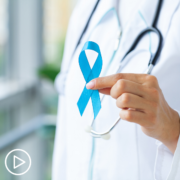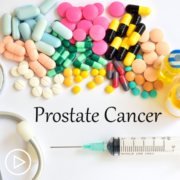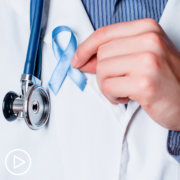Advanced Prostate Cancer Treatments on the Horizon
Advanced Prostate Cancer Treatments on the Horizon from Patient Empowerment Network on Vimeo.
What advanced prostate cancer treatments are on the horizon? Expert Dr. Ronald Chen discusses emerging treatments that are under study, the advantages that the treatments might offer, and how patients can potentially gain access to the therapies.
See More from START HERE Prostate Cancer
Related Resources:

How Is Advanced Prostate Cancer Explained to Newly Diagnosed Patients? |

|

START HERE | Collaborative Prostate Cancer Care Resource Guide |
Transcript:
Lisa Hatfield:
Are there any promising treatments on the horizon that you are particularly excited about for advanced prostate cancer? And what types of questions do you recommend patients and their care partners ask of their providers?
Dr. Ronald Chen:
I want to answer this question from the perspective of a…as a radiation oncologist. I am often involved in a lot of research and clinical trials related to how we can potentially better use the tool of radiation for patients with prostate cancer and advanced prostate cancer. And there’s actually quite a bit of exciting development in radiation that I think I’m really looking forward to seeing the results of those types of research. One area of, I think, promising treatment is something called radiopharmaceutical therapy.
So oftentimes, we think of radiation as a patient…there’s a machine that delivers a targeted beam of radiation to a particular tumor. And that’s what we usually think about. But actually, there’s a new wave of radiation and how we deliver it called radiopharmaceuticals. And radiopharmaceuticals is almost like getting chemotherapy. It’s something that’s infused into the bloodstream, almost like chemotherapy, but the way this treatment work called radiopharmaceuticals is that you’re actually infusing molecules that will actually tag on to tumor cells in the body, and then as it tags onto tumor cells in the body, deliver radiation to that tumor cell.
And they’re actually…so actually, it’s kind of like chemotherapy delivering actually radiation instead of a drug. And there are actually already are several of these radiopharmaceutical agents that have been proven to be effective. And two of these have already been FDA approved that are now in use for prostate cancer. And we know they work and they extend survival. And so, I think that’s very exciting.
And one of them is called lutetium Lu 177 vipivotide tetraxetan (Pluvicto). You’re infusing a molecule that specifically tags on to prostate cancer cells in the body and delivers a little bit of radiation to that cell. And that extends survival for patients. It’s actually a very well-tolerated treatment as well as actually now commonly in use FDA-approved. And I think that now that we have a couple of these FDA-approved, they were proven to work, I really do think that this field of radiopharmaceutical treatment will continue to expand. There’ll be more and more of these in the future. There’s more in clinical trials, and I think there’ll be more and more available options in the future. And I think it’s really going to be a great way to potentially use radiation to help patients with advanced prostate cancer and other cancers in the future.
Another thing that I’m really excited about is, again, I think the balance between extending a patient’s life expectancy and balancing the quality of life impact. We know that for patients with advanced prostate cancer, a common way to treat this disease is with hormone therapy. And oftentimes, people are on hormone therapy for years and years and maybe lifelong. And we also know that hormone therapy in patients with prostate cancer can also have really quite a bit of side effects. It can make people fatigued, weight gain, it may have cardiovascular disease impact. And so hormone therapy, even though it’s effective for prostate cancer, really has a big quality of life impact on patients.
So one of the current years of research and in clinical trials is, can we, instead of having patients with metastatic prostate cancer, instead of having them on hormone therapy for life, could we potentially use radiation selectively in the spots of metastasis? And if we’re able to use radiation to treat particular spots of metastasis and that’s controlled, can we let the patient then have a break from hormone therapy, which I think would really have an important quality of life improvement.
And so selectively using radiation to treat a few spots, allowing patients a break from hormone therapy is another area of research. There’s actually a couple of clinical trials already done on this. And what it’s shown so far is that if patients have one to three to five, a few spots of metastasis, using radiation can actually give patients a break from hormone therapy for two, three or four years for many patients. And that can really have a major impact on improving quality of life without compromising their survival outcomes. So I think I’m really excited about those kinds of areas of research.
One more treatment option like radiopharmaceuticals, two treatments that not compromise the patient’s survival, but improve quality of life. I’m excited about those directions. Oftentimes, the new developments and new treatments, the promising treatments are first available through clinical trials, and only through participating in clinical trials do you have access to that before it becomes FDA-approved. And oftentimes, that could be a really good option to consider. So that’s why I think it’s really important to ask that for every patient.



















